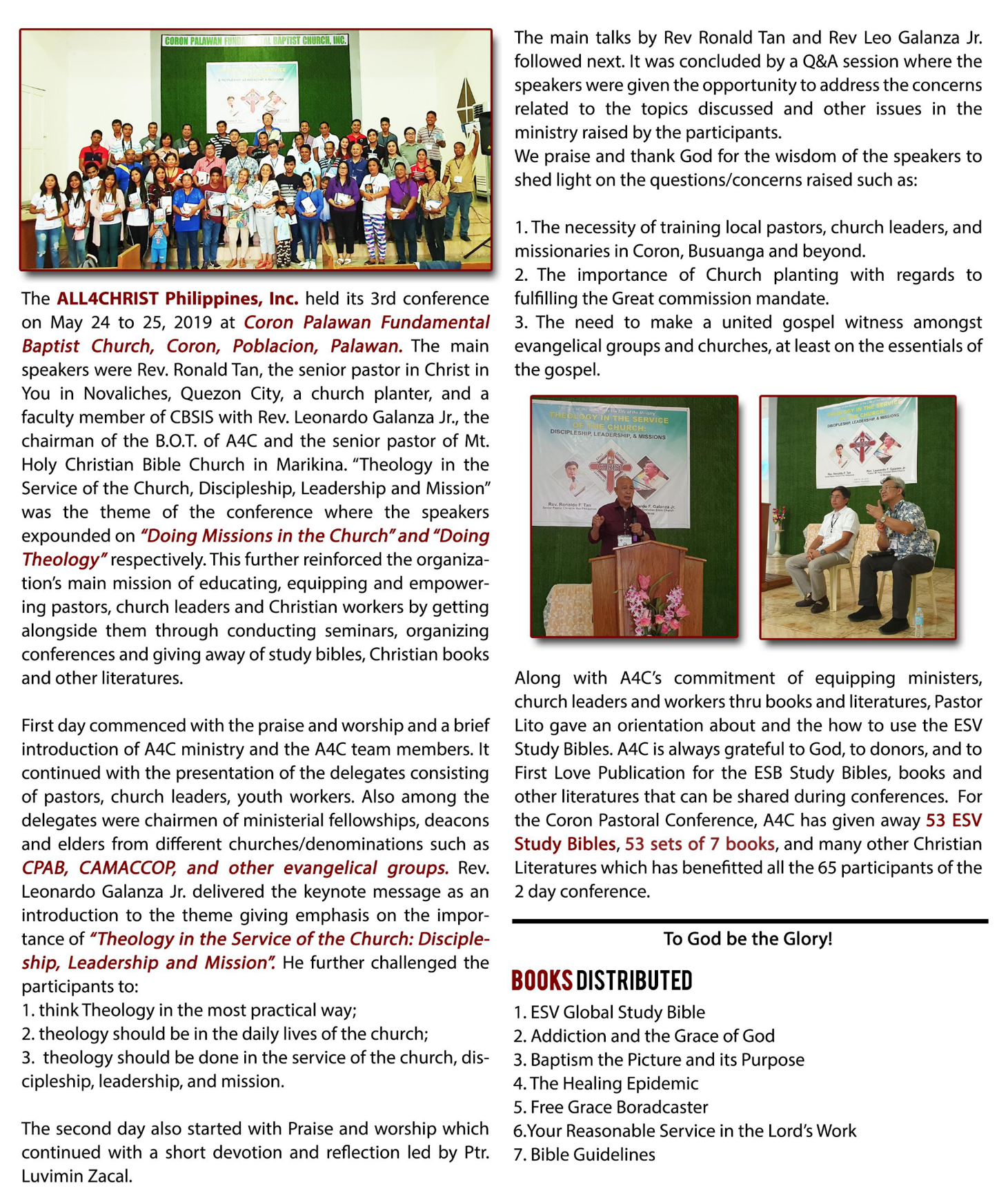Category: Monthly

The last command of our Lord Jesus was “Go therefore and make disciples of all nations” (Matthew 28:19 ESV). It was given to His eleven men, His disciples, and not to the multitudes. Why? Because it takes a disciple to make a disciple. If we are going to see strong, devoted disciples of Christ raised up under our leadership and discipleship, we ourselves must be a strong devoted disciple of Christ. It’s that simple.One of the primary goals of Christian leaders and disciplers is the deepening of the spiritual lives of those they lead. Their followers must grow in grace and the knowledge of Christ, developing in their effectiveness for Him and deepening their devotion. It is God’s desire that they demonstrate Christlike qualities in everyday life. The Bible is alive with examples of this. Under David’s leadership the men around him won battle after battle, defending the kingdom against the enemies of God. But the greatest accomplishments were in the lives of the men themselves. How were these men described when they came to David? “All those who were in distress or in debt or discontented gathered around him, and he became their leader. About four hundred men were with him” (1 Samuel 22:2 NIV).Later after association with David, these men became strong, dedicated, mighty men of valor. Scripture describes one of them, Eleazer, as … “one of the three mighty men…with David when they taunted the Philistines gathered at Pas Dammim for battle…. He stood his ground and struck down the Philistines till his hand grew tired and froze to the sword. The Lord brought about a great victory that day. The troops returned to Eleazer, but only to strip the dead” (2 Samuel 23:9-10 NIV).The influence of leaders and disciplers on their followers is interesting to observe in the Bible. For example, how many giant killers were in Saul’s army? None. When Goliath defied the armies of God, they shook with fear (1 Samuel 17:11). David, who came to bring food to his brothers, sized up the situation, went out in faith, and killed the giant. After David, the giant killer, became king, how many giant killers arose in Israel? Many. They were almost common in David’s army.“At that time Sibbecai the Hushathite killed Sippai, one of the descendants of the Rephaites, and the Philistines were subjugated.In another battle with the Philistines, Elhanan son of Jair killed Lahmi the brother of Goliath the Gittite, who had a spear with a shaft like a weaver’s rod.In still another battle, which took place at Gath, there was a huge man with six fingers on each hand and six toes on each foot—twenty-four in all. He also was descended from Rapha. When he taunted Israel, Jonathan son of Shimea, David’s brother, killed him.These were descendants of Rapha in Gath, and they fell at the hands of David and his men” (1 Chronicles 20:4-8 NIV).Why were there no giant killers in Saul’s army? One reason is that Saul himself was not one. However, under David’s leadership there were many. Why? Because David was one. This illustrates a powerful principle of leadership and discipleship which runs throughout the Bible. *It takes one to make one.*Here are some questions for thoughtful prayer:1. How would we feel if the Lord called us to shepherd a church of four hundred people like those described in 1 Samuel 22:2?2. How do we react to this principle of leadership and discipleship: “It takes one to make one.” Are we encouraged, frightened, challenged, or? Why?3. What signs do we look for to see if a person is ready to make disciples, either one-on-one or in a group setting?4. Read 2 Timothy 2:2. Does this pattern work with any age? Is it different with men and women? How about a parent to a child?Paul tells us in Ephesians 4:11-14 (ESV) what our primary work is as pastors, missionaries, evangelists and teachers. It says “And he (the Spirit) gave the apostles, the prophets, the evangelists, the shepherds, and teachers, to equip the saints for the work of ministry, for building up the body of Christ, until we all attain to the unity of the faith and of the knowledge of the Son of God, to mature manhood, to the measure of the stature of the fullness of Christ, so that we may no longer be children, tossed to and fro by the waves and carried about by every wind of doctrine, by human cunning, by craftiness in deceitful schemes”.Amen.

In Mark 12:28-31 Jesus responded to a question from a scribe. The question was “Which is the first commandment of all?” Jesus’ answer was “The first of all the commandments is: ‘Hear, O Israel, the Lord our God, the Lord is one. And you shall love the Lord your God with all your heart, with all your soul, with all your mind, and with all your strength.’ This is the first commandant. And the second, like it, is this: ‘You shall love your neighbor as yourself.’ There is no other commandment greater than these (NKJV).” Wow! These commandments are the bottomline of our everyday life in Christ with our brethren.
As followers of Jesus we are commanded to love God with all that we are. Coupled with our love for God we are to love our neighbor. Loving God and people go together and *cannot* be separated. Sometimes those of us in ministry think we love ministry but it is the people we cannot stand. Some eople we serve in our churches, specialized ministries, communities, schools, our coworkers and even our family members can be really difficult to love. People are messy. This is why George Verwer calls missiology “messy-ology”. Before Jesus ascended to the right hand of His Father He gave the so-called great commission to His twelve disciples. They were a motley bunch and He had no backup plan. They turned the world upside-down as they scattered among the nations with the gospel. The same is true of us today. We are imperfect and messy but living according to the commandments, by the grace of God, are required of us too. Let us learn to say from the heart when we offend people or make life difficult for others “I am sorry. Please forgive me.” If we truly disagree with someone let us disagree with an agreeable attitude. Let us not be disagreeable ornery people. Ministry will always be messy because people are messy. At best we are cracked pots but the treasure we contain is the gospel. As we go in the gospel let’s love people as we love the One who is sending us.

I have a simple assumption which is this: I hope that all servant-leaders want to finish well with our integrity intact. However, I predict one thing will hold true for current leaders and future leaders as it did for leaders before us. It is: *Many will start, but few will finish strong.* History is the story of good and bad leaders who have moved the world in directions both good and bad. We live in trying times in which we need great new servant-leaders to stand up and push aside self-centered leadership. Paul, one of the great leaders of the early church movement, affirms our desire, as disciples of Christ, to be a servant-leader in our generation, in his letter to his apprentice Timothy: “This is a trustworthy saying: ‘If someone aspires to be an elder (or overseer) he desires an honorable position’” (1 Timothy 3:1 NLT).
Servant-leaders, especially young ones, lead others with a vision filled with passion and enthusiasm. The reality is, though, that many servant-leaders quit leading in their forties and fifties and give up their dreams of influence. Servant-leaders make things happen, but people try to stop them. Servant-leaders not only fight our internal struggles, but we also bear the frustrations of others who can wear us down with unrealistic expectations. Many times servant-leaders give up on the battle of expectations and finally give up on trying to win the battle of expectations. It seems to me that discouragement in one of Satan’s strongest weapons he uses as he tries to take us out of ministry. Pastors of local churches are a unique type of servant-leader facing many challenges. According to a book written by Dean R. Hoge and Jacqueline E. Wenger called “Pastors in Transition” (Grand Rapids: Eerdmans 2005), on page 37 they cite six main reasons why pastors leave the ministry. They all relate servant-leadership of any kind. They are:
1. I felt drained by the demands on me. (58% of respondents listed as “great importance” or “somewhat important”)
2. I felt lonely or isolated. (51%)
3. I felt bored or constrained in the position. (43%)
4. I was not supported by denominational officials. (43%)
5. I found a better job outside of pastoral ministry. (38%)
6. I had marital or personal relationship problems. (27%)
Have you ever met someone who has given up on their calling to serve God? I have met men and women who gave up on their calling and I see a person filled with disappointment. The term *calling* is old school but it is vital to persevering through the ups and downs and twists and turns of ministry. Calling is following a higher purpose in life. It is listening to and obeying God’s still small voice. It is following the most compelling of many options regardless of the cost. It takes a lifetime to build a reputation of strong servant-leadership but moments to destroy it. For many who quit, however, it is not moral failure that got the best of them, but discouragement over a long period of time. Thomas Edison was a leader who refused to give up. He said, “Many of life’s failures are people who did not realize how close they were to success when they gave up.” True. True. True.
Servsnt-leadership at times is enjoyable and at other times it is a burden. Getting bogged down is a natural part of servant-leadership but the key is to get up, get unstuck, and keep going. We will be judged not by how times we fall but by how well we get up. This requires good old fashioned *diligence*. Diligence means “conscientiousness in paying proper attention to a task, persevering determination to perform a task” (www.thefreedictionary.com/
Brethren, soon all the organizations that older servant-leaders lead will be handed over to a new generation of servant-leaders. We are in the season of life and ministry when we need to have a succession plan for our replacement. Whether we are leading a church, a business, a local government or a nonprofit, the changing of the guard is at hand. I am excited what I see on the horizon. I see God raising up a new generation of servant-leaders so we need to lead with our leaving in view. This is not about clinging to a position but all about paving the way for future leaders. Our generation of leaders has a baton to pass to those following us. Let us do it well so we finish strong.









































